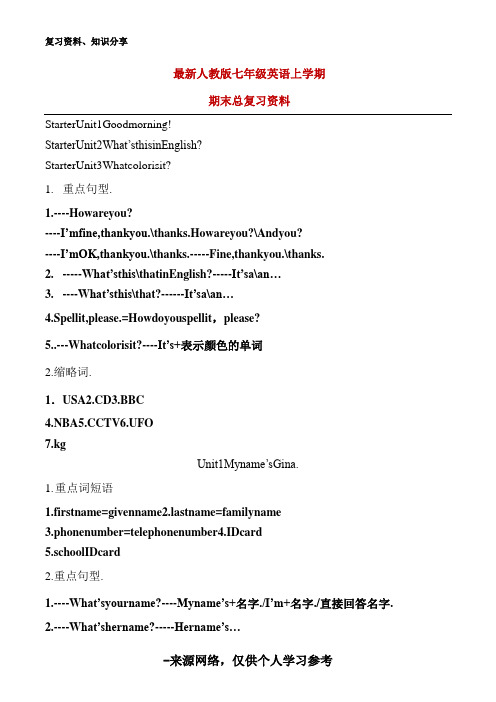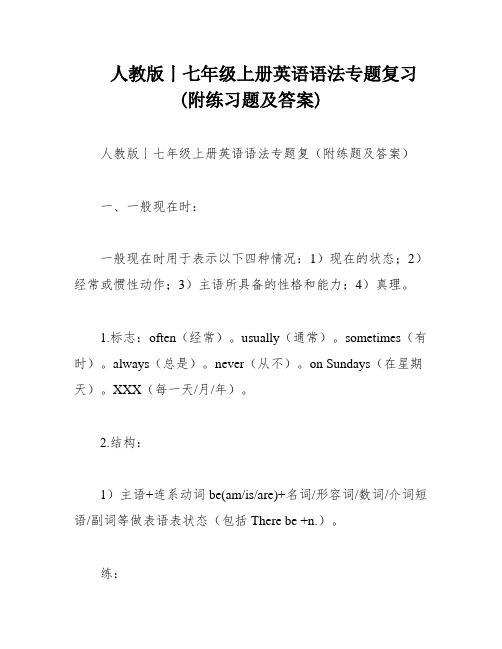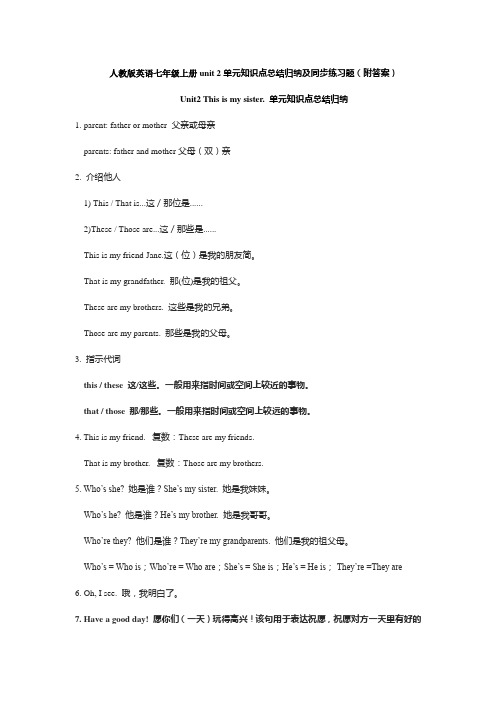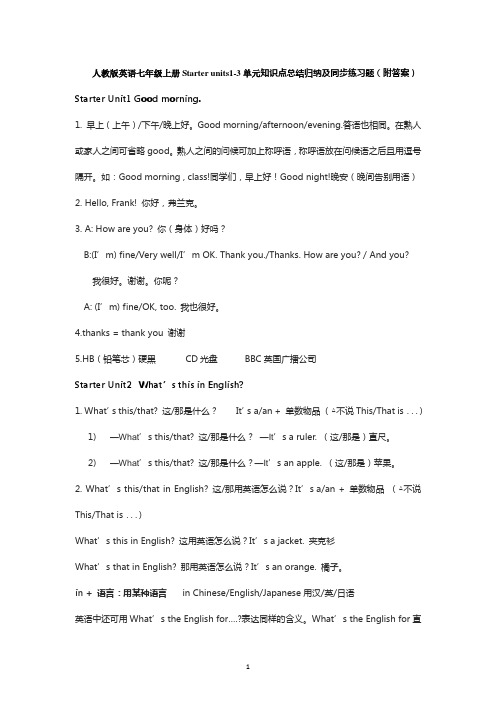人教版七年级英语上册知识点总结习题
人教版七年级英语上册Unit3单元知识点总结及同步练习题附答案

人教版七年级英语上册Unit3 Is this your pencil?单元知识总结归纳及同步练习题(附答案)Unit3 Is this your pencil?单元知识总结归纳1. 人称代词和物主代词1) 人称代词作主语时用主格;作宾语时用宾格;作表语时用主格或宾格,但在口语中常用宾格。
① I(作主语)am hungry, please give me(作宾语)something to eat. 我饿了,请给我一些吃的东西。
② I like her, and she likes me , too. 我喜欢她,她也喜欢我。
③ Who told him that news? 谁告诉他那个消息的?④It’s me/I. 是我。
2) 并列人称代词的排列顺序:人称代词在并列使用时,单数的顺序是第二人称→第三人称→第一人称;复数的顺序是第一人称→第二人称→第三人称。
you, he, and I 你,我,他you and I我和你he and I 我和他you and he 你和他we and you 我们和你们you and they 你们和他们we, you and they我们,你们和他们3) 形容词性物主代词修饰名词,必须放在名词前面,相当于形容词,在句中作定语。
名词性物主代词相当于名词(即指代名词,后面不能再加名词),在句中作主语、表语或宾语。
This is your ruler, it is not mine.这是你的尺子,不是我的。
2. Is this/that...? 这/那是......吗?Yes, it is. / No, it isn’t. 是的,这/那(它)是。
/ 不,这/那(它)不是。
回答时,要用it来代替this和that。
不可回答Yes, this/that is. / No, this/that isn’t.1)Is this your pencil ?这是你的铅笔吗?Yes, it is. It’s mine是的,它是我的(铅笔)。
(人教版2024新版)七年级上册 Unit 3 My School 知识点+练习卷(含答案)

Unit 3 My school.Phrase words在......前面. 餐厅.运动场张贴,搭建.怎么样做体操.Language point1.hall 礼堂;走廊; 大厅复数: halls必备搭配:dining hall 餐厅The hall was filled with students welcoming him.Now they are on their way to the dining hall.即学即练翻译:我们学校里有三个餐厅。
.2.in front of 在…前面;【辨析】in front of 与in the front ofin the front of... 在……(里面的)前部反义词组:at the back of...在……后面in front of...在……(外部的)前面反义词:behind在……后面He is standing in front of the car.The baby and I were in the front of the car.She is standing in the front of the classroom.即学即练:1. The teacher’s desk is ________ our classroom and ou r English teacher likes standing ___________ it .A. in front of; in the front ofB. in front of; in front ofC. in the front of; in the front of2. —There is a desk ___________ the hall.—Yes. And there is a tree ___________ the hall.A. in front of; in the front ofB. in the front of; in front ofC. in front of; in front of3. building 建筑(物); 楼房复数: buildingsThere are many beautiful buildings in Qingdao.在青岛有许多美丽的建筑词性变换:build 建造; 创立第三人称单数: builds; 现在分词: building; 过去式: built;They built 200 new houses last year.4.across 穿过,横过;He walked across the field.必备搭配:across from在对面The shoe store is across from the bank.即学即练:翻译:他们的房子在公园的对面. .辨析:across 横过;穿过through 穿过●across:平面穿过表示平面的词:street(街道), road(马路), playground(操场)Please be careful when you go across the road.●through:空间穿过表示空间的词:forest(森林), cave(山洞), window(窗户)They walked through the forest.即学即练:1)The bright sunlight comes into the room ______the window.A. throughB. acrossC. past2)---Shall I help you go ______ the street, Grandpa?---No, thanks. I can manage it myself.A. onB. withC. across3)We must ________ the road very carefully.4)Look! The man is swimming _______ the lake.5.field 场地;田地; 复数: fields必备搭配:sports field 运动场People were working in the fields.After finishing his homework, he goes to the sports field.即学即练:翻译:食堂在运动场的对面。
人教版七年级上册英语1-3单元知识点总结+练习

一、知识点1 按顺序默写26个英文字母(大小写形式都要写出来)。
二、知识点2 重点单词及短语1. Good morning ! 早上好!2. Good afternoon ! 下午好!3.Good evening ! 晚上好!4.How are you! 你身体好吗?5. I’m fine. 我身体很好。
6. Thanks! 谢谢!同Thank you7.I’m Ok. 我身体很好。
例题:早晨见面向某人问好时,应说:“_______________”。
A. HiB. Hello!C. Good morning!D. Good afternoon!解析:早晨见面问好应该说“Good morning”,故选C选项。
练习:()1.晚上见面向某人问好时,应说:“______________”。
A. Good morning !B. Good afternoon !C. Good evening !!D. Good night !()2.--How are you,Mary?-- _______ Jack.A. Good eveningB. Thank youC. I’m fine, thanks.D. How are you ?()3. You’re fine. I’m fine, too.A. goodB. OkC. niceD. bad()4. --You look (看起来) beautiful(漂亮的)today.--_____________.A. You too.B. No, I’m not.C. Thank youD. Not yet.8.in English用英语9.an orange一个橙子10.a ruler 一把尺子11.it's(=it is)它是12.Spell it.拼写一下它13.What's this?这是什么?14.what color 什么颜色15.black and white黑色和白色的;黑白相间的例题:What’s this _____________. ( 用英语)解析:in English用英语练习:()1. What's this _________ English?A. onB. inC. toD. for()2.-What's that?-It's a jacket.一_________it,please.-J-A-C-K-E-T.A. SayB. SpeakC. WriteD. Spell()3.-_________this?一It's a quiltA.How isB. What'sC. How areD. What are()4.-What color is the cow(奶牛)?--It’s__________________A. black or whiteB. black but whiteC. black and whiteD. black , white二、知识点3 重点句型及语法this和that的运用(1)this和that都是指示代词this意为“这;这个”,指近处或距说话人近的人或that意为“那;那个”,指远处或距说话人远的人或事物。
人教版七年级英语上册知识点总结及习题

七年级英语上册Start Unit 1 Good morning!1、Good morning! 早上好!Good afternoon!下午好!Good evening!晚上好!其回答都是其本身。
2、Nice to meet you ! 回答是:Nice to meet you ! 或Nice to meet you ,too!3、How do you do? 答语仍然是:How do you do?4、How are you? 答语是:Fine./I'm fine./I'm OK.Thanks.And you?5、动词be的一般现在时态:我(I)用am ,你(you)用are,is连着他(he)她(she)它(it)。
单数名词用is,复数名词全部都用are。
变否定,很简单,在be后把not加。
变疑问,be前提,句末问号莫丢弃。
变特疑,特殊疑问词加上一般疑问句。
Start Unit 2 What's this in English?1、this“这,这个”指示代词,用来指代距离较近的单个的人或物。
反义是that,用来指代距离比较远的单个的人或物。
this的复数是these;that的复数是those。
含有this/that把this/that提句首,其肯定回答是:Yes,it is.否定回答是:No,it isn't.含有these/those把these/those提句首,其肯定回答是:Yes,they are.否定回答是:No,they aren't.2、in+语言\声音\方式,“用......语言(声音、方式)” 例如:in English“用英语”3、a+辅音音素开头的单词或字母(读音)an+元音音素开头的单词或字母(读音)4、What's this in English? 回答是:It's a/an+可数名词单数。
5、What're these in English? 回答是:They are+可数名词复数或不可数名词。
人教版英语七年级上册知识点归纳及练习(卷)【最新整理】

复习资料、知识分享最新人教版七年级英语上学期期末总复习资料StarterUnit1Goodmorning!StarterUnit2What’sthisinEnglish?StarterUnit3Whatcolorisit?1.--------2.3.2.1.1.3.phonenumber=telephonenumber4.IDcard5.schoolIDcard2.重点句型.1.----What’syourname?----Myname’s+名字./I’m+名字./直接回答名字.2.----What’shername?-----Hername’s…3.------What’shisname?-----Hisname’s…4.--What’syourtelephonenumber?----It’s+电话号码.\Mytelephonenumberis+号码5.---What’sher\histelephonenumber?----Her\Histelephonenumberis+号码6.---Nicetomeetyou!-----Nicetomeetyou,too.3.知识点1.后姓2.,单3.it(它)it(它)its(它的)复数:人称主格宾格形容词性物主代词名词性物主代词第一人称we(我们)us(我们)our(我们的)第二人称you(你们) you(你们) your(你们的)第三人称they(他她它)们them(他她它)们their(他她它)们的c.用法:动前主格动后宾,名前形容介后宾。
(动词前用主格,动词后用宾格;名词前用形容词性物主代词,介词后用宾格。
)d.不定冠词a与an的用法:都表示“一个,一张,一件”等义,一般用于单数名词IA.our,HerB.my,HeC.a,SheD.an,She()6.—YourEnglishisverygood.—_________.A.No,itisn’t.B.Yes,itis.C.Thankyou.D.No.()7.ThemanNickHand.____ishisfamilyname,and___ishisgivenname.A.Nick,HandB.Hand,NickC.Hand,HandD.Nick,Nick()8.LucyandTony___mygoodfriends.A.amB.isC.areD.be()9.----What’sthatinEnglish?-----_______IDcard.A.ThisisaB.That’sanC.It’saD.It’san()10.Myname___Alice,__nameisTony.A.am,herB.is,hisC.is,herD.am,hisII1.1.2.4.Issheyoursister?---Y es,sheis.---No,sheisn’t.5.Isheyourfather?---Yes,heis.---No,heisn’t.6.Thisismycousin.Thatismybrother.7.Thesearemycousins.3.知识点1.介绍人的句型:Thisis+某人.\Theseare+某人.(指着距离较近的人进行介绍)Thatis+某人.\Theseare+某人.(指着距离较远的人进行介绍)2.对“this”/“that”直接做主语的疑问句回答时,答句的主语用“it”.3.对“these”/“those”作主语的疑问句回答时,答句的主语用“they”.4.Thanksfor…=Thankyoufor…为……而感谢.5.名词所有格:是指在某一名词后右上角打“’s”,表示“……的”这一结构形式。
人教版丨七年级上册英语语法专题复习(附练习题及答案)

人教版丨七年级上册英语语法专题复习(附练习题及答案)人教版丨七年级上册英语语法专题复(附练题及答案)一、一般现在时:一般现在时用于表示以下四种情况:1)现在的状态;2)经常或惯性动作;3)主语所具备的性格和能力;4)真理。
1.标志:often(经常)。
usually(通常)。
sometimes(有时)。
always(总是)。
never(从不)。
on Sundays(在星期天)。
XXX(每一天/月/年)。
2.结构:1)主语+连系动词be(am/is/are)+名词/形容词/数词/介词短语/副词等做表语表状态(包括There be +n.)。
练:1.I am a student。
My name is Tom.2.Where are my shoes。
They are here.3.Who is the girl with long straight hair。
I think she is Kate.4.You and I are not in Class Six.5.XXX。
Yes。
there is.6.XXX。
No。
they aren't.2)主语(非第三人称单数)+行为动词原形+其他(用助动词do帮助构成否定句、一般疑问句和特殊疑问)。
3)主语(第三人称单数)+行为动词的第三人称单数+其他(用助动词does帮助构成否定句、一般疑问句和特殊疑问句)。
行为动词第三人称单数加-s的形式:1.-s2.辅音+y: study-studies3.以s,x,ch,sh结尾: watch-watches。
XXX4.特殊: have-has。
do-does。
go-goes。
练:1.His parents watch TV every night.肯定句:1.XXX.否定句:2.His parents do not watch TV every night.n: My brother does not do homework every day。
人教版英语七年级上册unit 2 This is my sister 单元知识点总结归纳及同步练习题(附答案)

人教版英语七年级上册unit 2单元知识点总结归纳及同步练习题(附答案)Unit2 This is my sister.单元知识点总结归纳1. parent: father or mother 父亲或母亲parents: father and mother父母(双)亲2. 介绍他人1) This / That is...这/那位是......2)These / Those are...这/那些是......This is my friend Jane.这(位)是我的朋友简。
That is my grandfather. 那(位)是我的祖父。
These are my brothers. 这些是我的兄弟。
Those are my parents. 那些是我的父母。
3. 指示代词this / these 这/这些。
一般用来指时间或空间上较近的事物。
that / those 那/那些。
一般用来指时间或空间上较远的事物。
4. This is my friend. 复数:These are my friends.That is my brother. 复数:Those are my brothers.5. Who’s she? 她是谁?She’s my sister. 她是我妹妹。
Who’s he? 他是谁?He’s my brother. 她是我哥哥。
Who’re they? 他们是谁?They’re my grandparents. 他们是我的祖父母。
Who’s = Who is;Who’re = Who are;She’s = She is;He’s = He is;They’re =They are6. Oh, I see. 哦,我明白了。
7. Have a good day! 愿你们(一天)玩得高兴!该句用于表达祝愿,祝愿对方一天里有好的心情和运气。
Day还可用morning, afternoon, evening等词语代替。
人教版英语七年级上册Starter units1-3单元知识点总结归纳及同步练习题(附答案)

人教版英语七年级上册Starter units1-3单元知识点总结归纳及同步练习题(附答案)Starter Unit1 Good morning.1. 早上(上午)/下午/晚上好。
Good morning/afternoon/evening.答语也相同。
在熟人或家人之间可省略good。
熟人之间的问候可加上称呼语,称呼语放在问候语之后且用逗号隔开。
如:Good morning , class!同学们,早上好!Good night!晚安(晚间告别用语)2. Hello, Frank! 你好,弗兰克。
3. A: How are you? 你(身体)好吗?B:(I’m) fine/Very well/I’m OK. Thank you./Thanks. How are you? / And you?我很好。
谢谢。
你呢?A: (I’m) fine/OK, too. 我也很好。
4.thanks = thank you 谢谢5.HB(铅笔芯)硬黑 CD光盘BBC英国广播公司Starter Unit2 What’s this in English?1. What’s this/that? 这/那是什么?It’s a/an + 单数物品(△不说This/That is...)1)—What’s this/that? 这/那是什么?—It’s a ruler. (这/那是)直尺。
2)—What’s this/that? 这/那是什么?—It’s an apple. (这/那是)苹果。
2. What’s this/that in English? 这/那用英语怎么说?It’s a/an + 单数物品(△不说This/That is...)What’s this in English? 这用英语怎么说?It’s a jacket. 夹克衫What’s that in English? 那用英语怎么说?It’s an orange. 橘子。
- 1、下载文档前请自行甄别文档内容的完整性,平台不提供额外的编辑、内容补充、找答案等附加服务。
- 2、"仅部分预览"的文档,不可在线预览部分如存在完整性等问题,可反馈申请退款(可完整预览的文档不适用该条件!)。
- 3、如文档侵犯您的权益,请联系客服反馈,我们会尽快为您处理(人工客服工作时间:9:00-18:30)。
七年级英语上册Start Unit 1 Good morning!1、Good morning! 早上好!Good afternoon!下午好!Good evening!晚上好!其回答都是其本身。
2、Nice to meet you !回答是:Nice to meet you !或Nice to meet you ,too!3、How do you do?答语仍然是:How do you do?4、How are you?答语是:Fine./I'm fine./I'm OK.Thanks.And you?5、动词be的一般现在时态:我(I)用 am ,你(you)用 are, is连着他(he)她(she)它(it)。
单数名词用 is,复数名词全部都用are。
变否定,很简单,在be后把not加。
变一般疑问句,把be提句首,句末问号莫丢弃。
变特殊疑问句,特殊疑问词加上一般疑问句。
Start Unit 2 What's this in English?1、this“这,这个”指示代词,用来指代距离较近的单个的人或物。
反义是that,用来指代距离比较远的单个的人或物。
this的复数是these;that的复数是 those。
含有this/that把this/that提句首,其肯定回答是:Yes,it is.否定回答是:No,it isn't.含有these/those把these/those提句首,其肯定回答是:Yes,they are.否定回答是:No,they aren't.2、in+语言\声音\方式,“用......语言(声音、方式)”例如:in English“用英语”3、a+辅音音素开头的单词或字母(读音)an+元音音素开头的单词或字母(读音)4、What's this in English? 回答是:It's a/an+可数名词单数。
5、What're these in English? 回答是:They are+可数名词复数或不可数名词。
Start Unit 3 What color is it?1、不定冠词a,an的用法:1)表示数量“一”;2)笼统地指某人或某物但不具体说明;3)泛指一类事物;4)表示首次提到的人或物(常用于介绍用语中)。
2、定冠词the的用法:1)特指某(些)人或者事物或双方都知道的人或事物;2)上文提到过的人或物;3)世界上第一无二的事物前,或某一范围内唯一的某事物前。
4)某些由普通名词构成的专有名词前。
5)一些习惯用语和乐器前。
3、What color is it? 回答是:It's+颜色的形容词。
4、What color are they? 回答是:They are+颜色的形容词。
Unit 1 My name’s Gina.重点词汇:0-9重点短语:1.telephone number2.phone number3.first name4.姓氏5.family name6.中学7.在中国8.他的电话号码9.What’s =10. I’m=’s =重点语法:1、英文名Tony Brown中Tony为first name(名),Brown为last name或family name(姓)。
2、人称代词3、物主代词记忆口诀:一个变(my变成mine),两个不变(his, its),其它的都加“s”。
句式:1. What +be 动词+your(his/her) name? What’s your name?What’s his name?What’s her name?2. 自我介绍时常用语:My name’s Jenny. I’m Gina.3.表达第一次和某人见面的高兴之情:Nice to meet you!4. 询问别人的电话号码:What’s your telephone number?5. 询问别人的姓氏常用语:What’s her family na me?Unit 2 This is my sister.词汇:称呼类词汇:姐;妹妈妈爸爸兄;弟祖母;外祖母祖父;外祖父姑母;伯母;婶母叔;伯;舅;姨夫儿子表(堂)兄弟(姐妹)女儿重点短语:thanks forlook atin the first picture talk aboutfamily treea photo of my familywrite a letter (to)重点语法:1、指示代词: this这(个), that那(个), these 这些, those 那些2、名词的复数形式A、一般情况下加-s,如book — books ;B、以e结尾的词加-s,如case — cases ;C、以s、x、sh、ch等结尾的词加-es,如watch — watches ;D、以辅音字母加y结尾的词,要改y为i,再加-es,如family — families ;E、以“f”或“fe”结尾的词,改“f”或“fe”为“v”,再加-es ;F、部分以o结尾的词加-es,如tomato — tomatoes ;potato — potatoes ;G、少数名词的复数形式是不规则的,如man — men ;woman — women .3. 本单元出现的缩写:that’s = that is he’s = he is4. thanks for 为……而感谢Thanks for the photo of your family.句式:1. This/that is+ sb’s …This is his sister. That is my brother.These/Those+ are+ sb’s …These are his brother.2. be动词+代词+…Is this your sister? Is she your sister?3. Her e +be +… Here is my family photo.Unit 3 Is this your pencil?词汇:文具盒铅笔钢笔橡皮擦尺子书包字典书2.指示代词:this 这个that 那个重点短语:in English打扰了play baseball computer game lost and founda set of keyscall Allen at 4561534call sb.call 4561534身份证重点语法:1、指示代词(this, that);2、形容词性物主代词的用法。
注意:物主代词的使用方法:后有名词时用形容词性的,后无名词时用名词性的,即:有名则形,无名则名。
3、以be动词“is ,are”开头的一般疑问句。
一般疑问句是以be动词、情态动词和Do/Does开头的,用Yes或No回答的疑问句。
注意事项:1、肯定和否定回答中必须用人称代词主格,即只能用I,we,you,he,she,it,they等,不能出现其它词,特别注意不能用this,that,these,those等指示代词。
2、肯定和否定回答要保持三个单词,因此当am,is,are出现在句尾时,一定不能缩写。
如:不能用Yes,I’m; Yes,he’s;Yes,they’re.3、am not 不能缩写,如:No,I’m not不能用No.I amn’t.4、肯定和否定回答不能出现前后矛盾。
如:不能说Yes,he isn’t; No,I do; Yes,she doesn’t.句式:1. 询问某物品是否属于某人的问句及答语—Is this/that your pencil? —Yes, it is. It’s my pencil./No, it isn’t. It’s his p encil.2. 询问某物用英语怎么说What’s this in English?3. How do you spell sth.? How do you spell it?4. What’s +sth?询问某物是什么—What’s this? —It’s a watch.5. Call at sb. at +电话号码. Call Alan at 495-3539.练习:1) What’s this? It’s V. A. a B.an C.the D.\2) Good night. A. Good evening. B.See you. C.All right.3) ---------- a lot . A. Thank B.Thanks C.Thanks you D.Thanks for4) How is your father? He is -------.A good B.nice C.OK5)What’s his (one) name? I don’t know. But I know his last name. 6)Is this ------eraser? No.It’s -------. A. his his B. his hers C. her hers7)Is that her pencil? Yes,------is.n A. it B. that C.She8)------- you spell it? Yes.P-E-N pen. A. How B.Can C.\9)Please call our school ------4516324. A. with B.\ C.at D.onUnit 4 Where’s my schoolbag?词汇:1.本单元出现的家具类词汇:桌子床书橱,书柜沙发椅子房间书桌时钟重点短语:在桌子上在他的文具盒里watch TV where’s = 在桌子底下在沙发上在我的书包里在书柜里在他的头上在我们的房间里重点语法:1、介词on(在…上), in(在…里), under(在…下)的用法。
2、以特殊疑问词where开头的特殊疑问句及回答。
句式:1.询问地点——Where + is + 单数物品?答语It is+ 表位置的介词短语. Where + are + 复数物品?答语They are + 表位置的介词短语.—Where’s my backpack?—It’s under the table.—Where are your books?—They’re on the chair.2.询问某物是否在某地的句型及答语—Is the baseball on the sofa?—No,it isn’t. It’s under the chair.—Are they on the bed?—No,they’re not.3.倒装句——Here + be动词+ 主语Here is my pen.Here are some apples.1)_______(this) are my parents. 2)_______(that) are his friends.3)Is t his his father? No,_______ isn’t. A.it B.this C.he4)Is his mother your friend? Yes,________is. A.he B.she C.you5)Thanks _________your interesting book. A.for B. very much C.a lot6)There _______(be)a photo of my friends.Unit 5 Do you have a soccer ball?词汇:1.球类名词小结英式足球乒乓球网球排球篮球棒球重点短语:play soccer play tennis play basketball doesn’t = let’s =play sportsevery dayon TVplay tennis乒乓球拍打排球3.play + 名词结构的短语play sports参加体育运动play computer games玩电脑游戏4.“play + 球类名词”结构的短语play ping-pong 打乒乓球play tennis 打网球5.watch TV看电视on TV在电视上,通过电视6.常用的描述某物或某事的形容词:interesting有趣的fun有趣的relaxing轻松的boring无聊的difficult困难的重点语法:1、以助动词do,does开头的一般疑问句。
